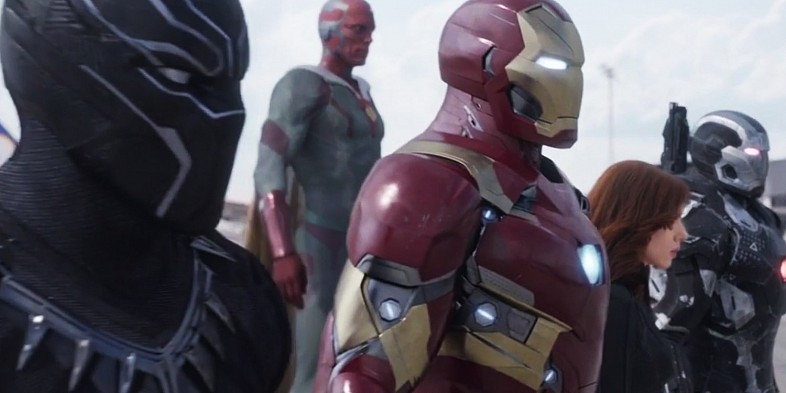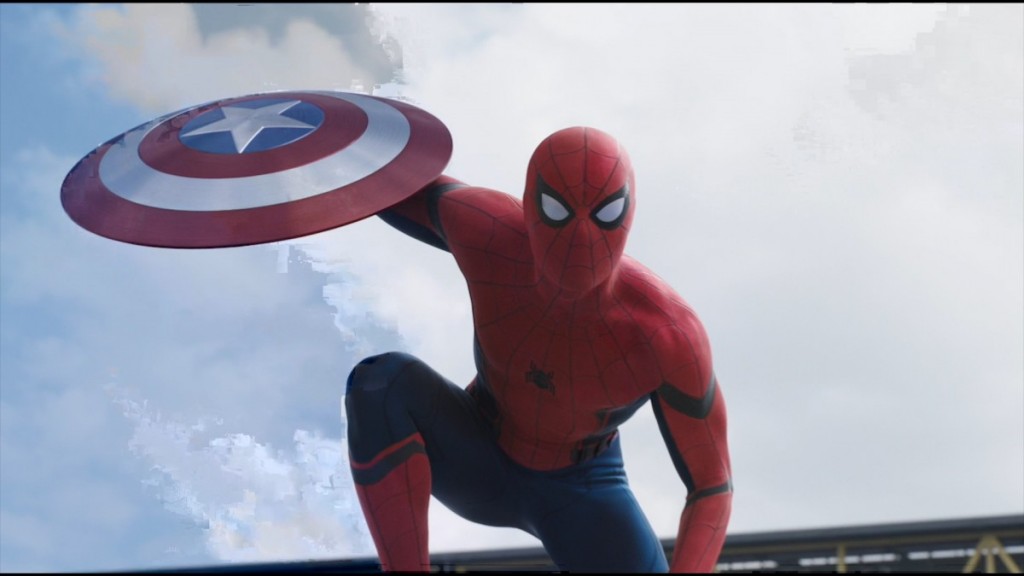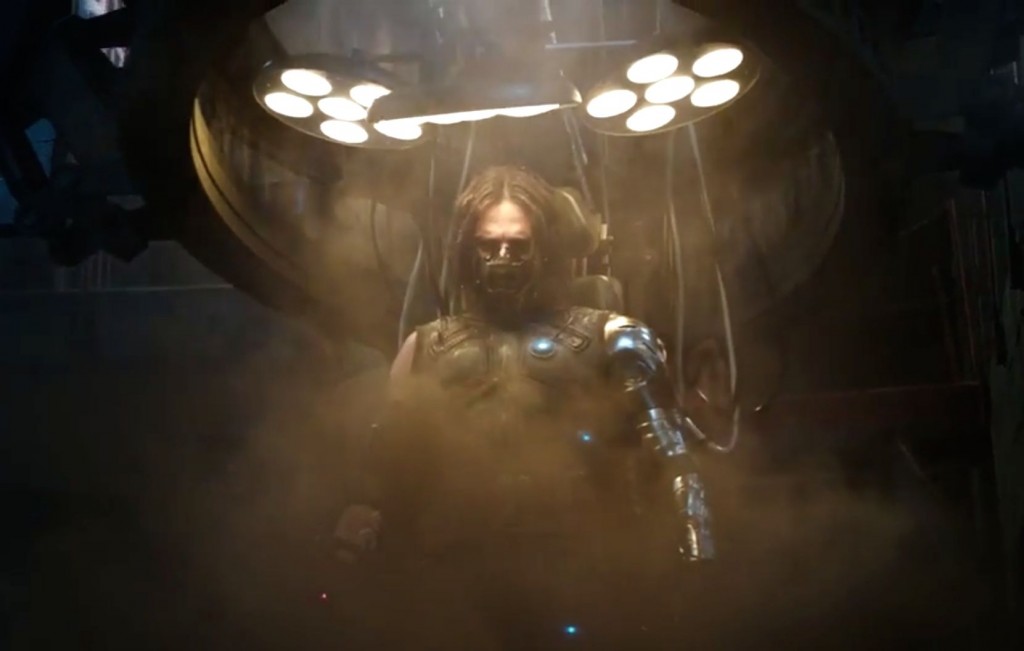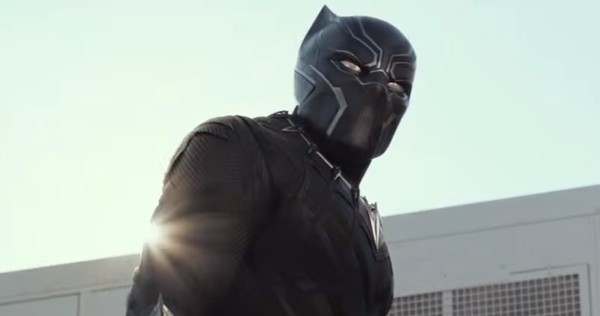Last Friday, Captain America: Civil War opened in theaters. Today, members of the Deadshirt staff ask: What’s so Civil about War, anyway?
Captain America: Civil War is one of the least standalone movies I’ve ever seen, and that’s part of what makes it great. Perhaps never before has a movie leaned so heavily on an audience’s knowledge of characters from previous films in the same franchise, and even from a different film franchise. Three of the most emotional scenes in this film are built around characters that do not appear outside of brief retrospectives. This just gives directors Anthony and Joe Russo and producer Kevin Feige more bang for their buck. At this point, audience knowledge of Marvel’s stable of characters can be taken as a given. In this way, the Marvel films are becoming analogous to the comics themselves.
The arcs of almost a dozen returning characters are advanced, without stealing from this film’s core story with tedious exposition and rote resolution. (That’s why this is a Cap film rather than an Avengers film.) The motivations of the antagonists feel like a natural consequence of the events of the previous movies. And the ultimate conflict between Tony Stark and Steve Rogers is, in retrospect, the inevitable result of seeds that were planted years prior. Feige and Marvel Studios play the long game very well.
Despite the almost Shakespearian tragedy of the third act, Civil War manages to repudiate the darkness and despair of Batman v. Superman with the crowd-pleasing, punches-pulled brawl between the two sides. Tom Holland’s Spider-Man and Paul Rudd’s Ant-Man gleefully shake up the dark-clad spies and soldiers that populate the Avengers, and paint a new path forward for Hollywood as technology continues to catch up to the boundless imaginations of Ditko and Kirby. But, refusing to be upstaged, it is Chadwick Boseman’s Black Panther who masters his tragedy and emerges the purest superhero of them all.
– Patrick Stinson
Civil War is a gigantic movie, and its opening act kind of suffers from this fact. Giant location title cards announce characters are undertaking a mission in LAGOS before Captain America has to head to LONDON for the funeral of Peggy Carter. Even though this is Captain America 3, it’s really Avengers 3, given that the film is truly an ensemble piece (that, admittedly, hinges on Steve Rogers and the choices he makes). The Marvel movies and their relationship with collateral damage has been something unspoken of in the background since the original Iron Man and here it’s confronted head on after The Avengers accidentally blow up an occupied building trying to stop Crossbones (Frank Grillo, R.I.P.).
The moment Civil War clicked for me (and probably a lot of others) is when the film shifts from exotic Bond movie locations to the LeFrak City apartment where Peter Parker resides. After five not-totally successful attempts, we finally have a cinematic Spider-Man who EFFORTLESSLY feels like it’s off of the page, while also feeling like a bold new vision of the character. Holland’s “aw shucks” excitement as Spider-Man fights a guy with a robot arm or banters with Captain America really elevates the entire movie because it feels so fresh. We’ve never seen a Spider-Man like this, and I think we all desperately want to see more.
Spider-Man (and his Team Cap counterpart, Ant-Man) are total show stealers here, but the really impressive thing about Civil War is how it manages to balance such a huge cast. This is ScarJo’s best outing as Black Widow, Cap and Iron Man’s mutual bestie who’s just trying to keep together the found family she’s grown to love. Elizabeth Olsen was wasted in Age of Ultron, but here she feels like a real human being struggling to do the right thing with her very dangerous powers. While Chadwick Boseman’s T’Challa could’ve easily felt like an afterthought, here he serves as the regal moral conscience of the movie in a role that feels extremely natural and necessary.
Civil War triumphs as a semi-conclusion to the eight-year storyline the Marvel Studios films have laid down. The irrevocable schism in Steve and Tony’s friendship is based in the lived-in fabric of these movies, a natural and inevitable progression that feels ten times more real than the Mark Millar comic it’s inspired by. In many ways, this feels like the Russos putting to bed the first act of the live action Marvel Universe and preparing to embark on something even more exciting.
– Max Robinson
From the moment Marvel Studios announced the title of the third Captain America film, many fans worried that Civil War would really be Avengers 2.5, and that Cap would have to take a backseat in his own film. And while it’s not an exaggeration to call Civil War an Avengers movie, its story still does more with the character of Steve Rogers than either of its (damn excellent) predecessors. One of the reasons audiences love the MCU’s take on Captain America is his pure heart and moral certainty. While the rest of the Avengers struggle against their own flaws, Steve, so far, hasn’t really had any to speak of. Civil War changes all that, without compromising any of what we love about the character.
In Civil War, sainted Steve Rogers finally does something selfish, when he rebels against the will of the world’s governments and his closest allies to protect his best friend, a fugitive from justice. He conceals an awful truth about Bucky Barnes from the world and from Tony Stark, and that mistake (quite justly) blows up in his face. Steve chooses Bucky over everyone because Bucky basically belongs to him. After the death of Peggy Carter, Bucky is Steve’s last connection to the world he fought for back in the 1940s, and Bucky has literally no one else but Steve. That Bucky is falsely accused of bombing the UN summit is irrelevant; Cap would take a bullet for him anyway, and it really has nothing to do with justice. This isn’t evil, it’s human, it’s love.
His actions aren’t categorically wrong—this is still Steve Rogers—but they are more about what he wants than what the world needs. Civil War isn’t a film about moral relativism, it’s a story about good people making questionable decisions, and I found the most admirable quality of this film to be that, while I disagree with much of what Captain America does in the film, he’s still my hero when the credits roll.
– Dylan Roth
For better or worse, this movie pretty much nails its aim: trying to recapture the feeling of the last arc of someone’s superhero comics run that ends up getting repurposed into a linewide event. Almost every element of this movie is a reprise or resolution of an element from a previous Marvel Cinematic Universe installment, and it’s clear the producers think of this as a feature, not a bug.
People were worried about excess in Civil War—excess of character, excess of plot, excess of action—and all of those worries were fair, but rather than be dragged down by that excess, the movie revels in it and works around it. The cast is huge, but the film’s structure smartly frontloads the most central emotional stakes early on in the movie, so that by the time the cameos come in as ringers to give the climax a true Superhero Event feel, they add to the tension rather than distract from it. The movie’s big physical climax really is magnificent to behold, a true-blue large-scale superhero battle captured on the silver screen with cool shit going on every second, burdened with uncanny-valley CGI that only makes it more painful to see the flawed execution of a bunch of really cool ideas.
It’s surprising how much of the original Mark Millar/Steve McNiven arc screenwriters Christopher Markus and Stephen McFeely retain, and how many of McNiven’s images the Russo brothers employ in the shots—and yet this movie contains few of its source material’s issues. It’s almost like the product of a dare to try to recycle and make work as many dumb ideas from the original event as possible. A lot of the best set pieces, speeches and panels are reused, but in new contexts that make narrative sense. I’m excited to see how this team performs riffing on Marvel’s cosmic events in Infinity War in a couple of years, but for now this is the closest big screen approximation to a superhero event comic I’ve ever seen. Whether that’s a good or a bad thing, you probably already know for yourself.
– David Uzumeri





